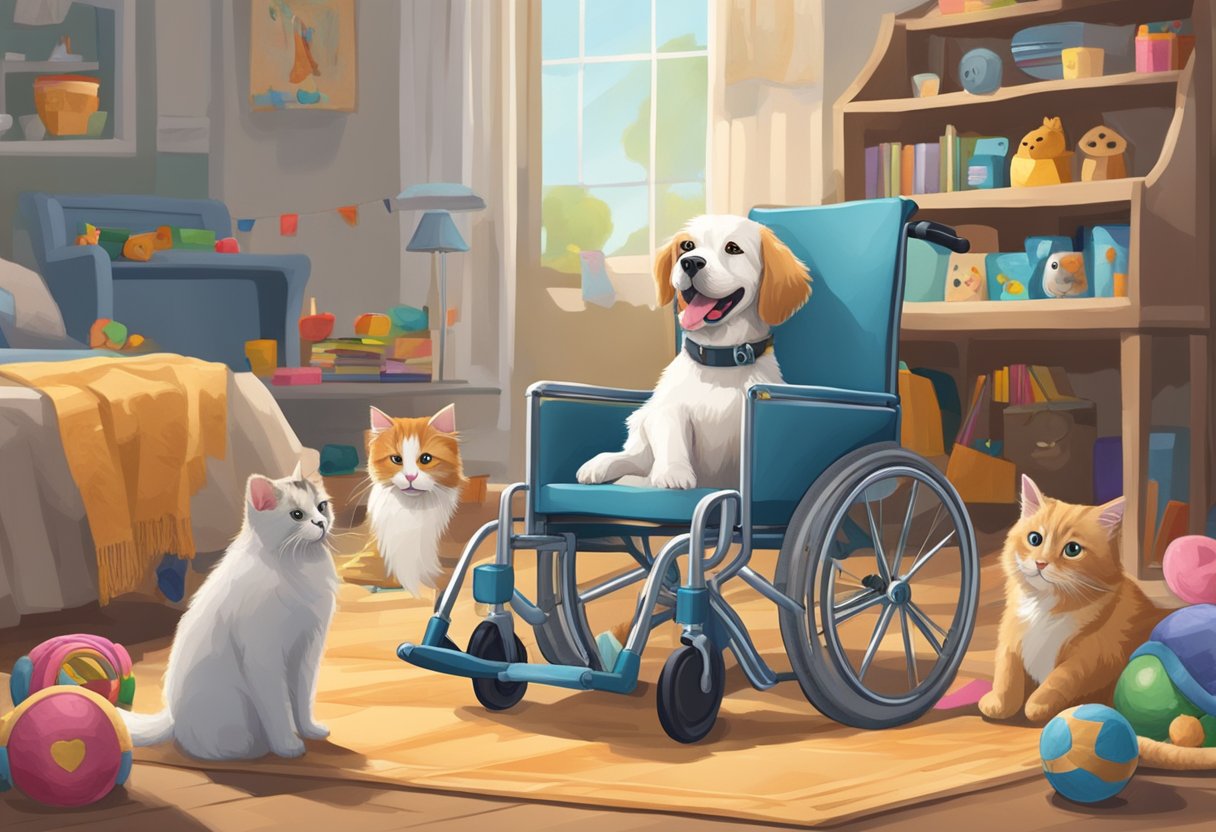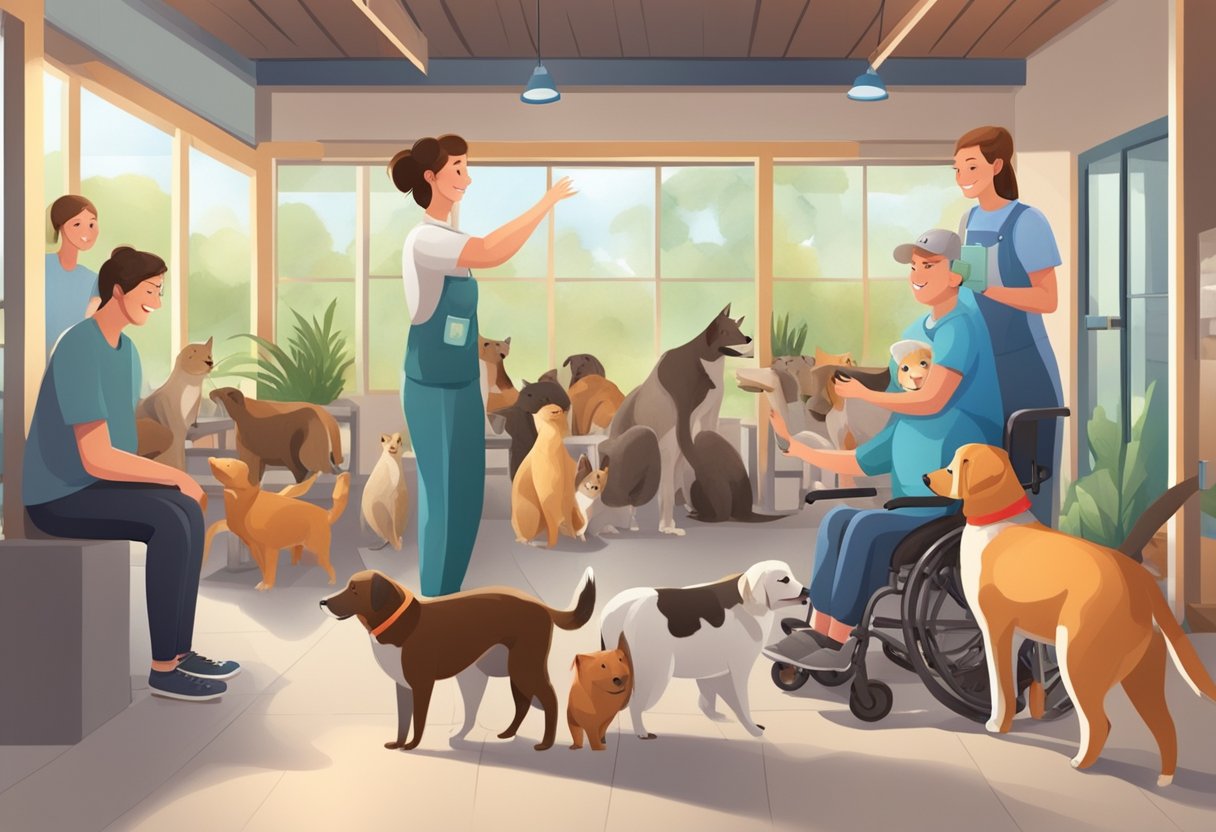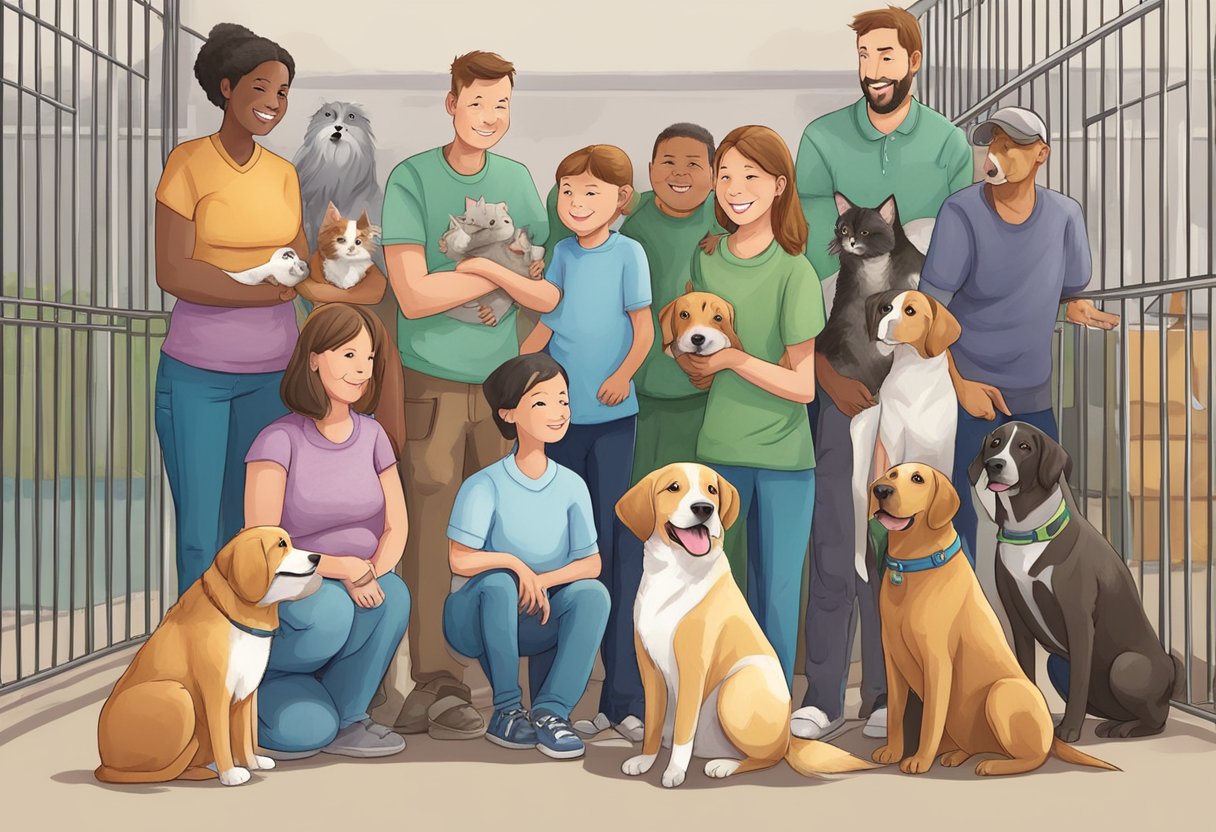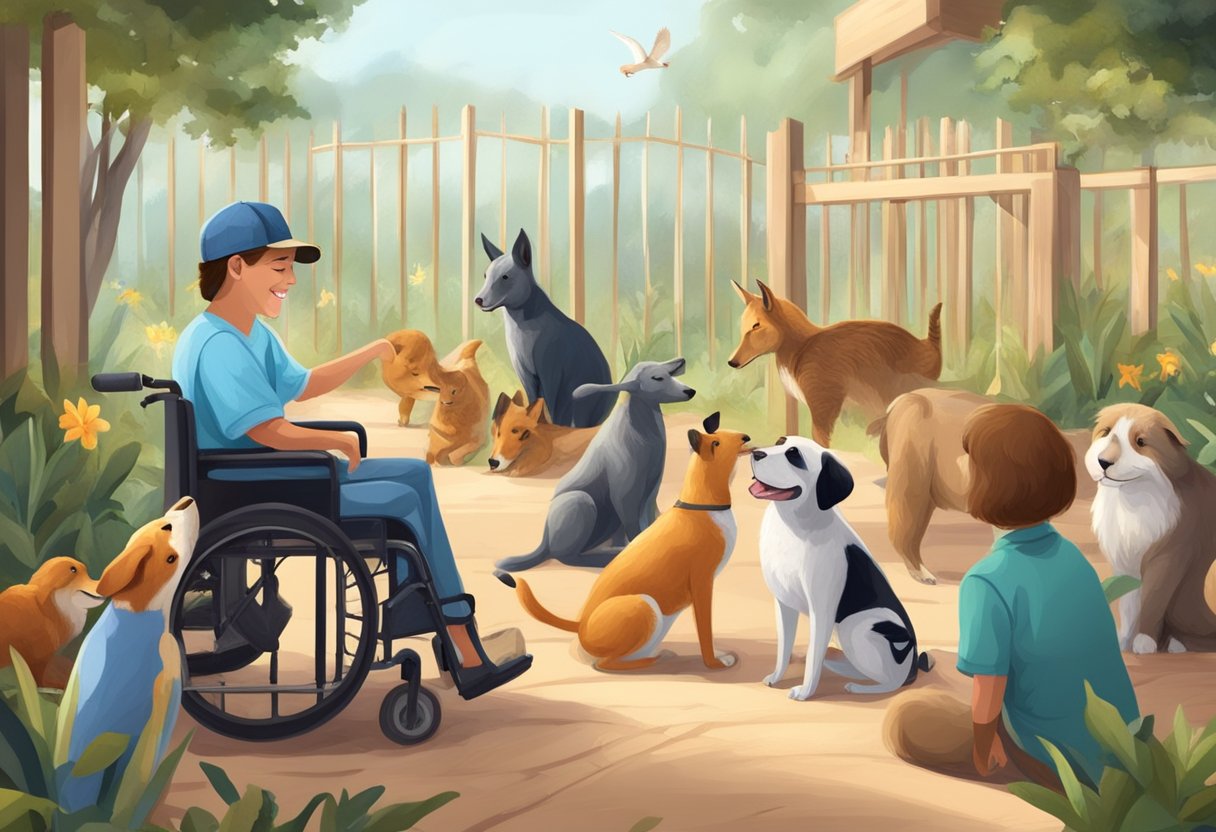Adopting Special Needs Animals: Stories of Hope and Love

Adopting a pet is a big decision, and it can be even more daunting when considering adopting a special needs animal. However, the rewards of adopting a special needs pet can be immeasurable.
These animals often have a lot of love to give and can teach their owners valuable lessons about patience, compassion, and resilience.
While there may be challenges that come with adopting a special needs pet, there are also many joys to be had.
Understanding Special Needs in Animals
Special needs animals can come in many different forms. They may have physical disabilities, such as blindness or deafness, or they may have behavioral issues that require extra attention and training.
It’s important for potential adopters to have a good understanding of the specific needs of the animal they are considering adopting.
This can involve doing research, talking to veterinarians or animal behaviorists, and spending time with the animal in question to get a sense of their personality and needs.
Successful Adoption Stories
There are countless stories of successful adoptions of special needs animals. These stories can be a source of inspiration and hope for those considering adopting a special needs pet.
They can also provide valuable insights into the types of challenges and rewards that come with adopting a special needs animal.
By sharing these stories, we can help to raise awareness about the joys and challenges of adopting special needs pets and encourage more people to consider giving these animals a loving home.
Key Takeaways
- Adopting a special needs animal can be a rewarding experience.
- Understanding the specific needs of the animal is crucial for a successful adoption.
- There are many inspiring stories of successful adoptions of special needs animals.
The Joys and Challenges of Special Needs Pets

Adopting a special needs pet can be a rewarding experience, but it also comes with its own set of challenges.
It requires a lot of love, patience, and dedication, but the joy and love that these animals can bring into your life makes it all worth it.
One of the challenges of adopting a special needs pet is the extra care and attention they require.
Depending on the animal’s specific needs, you may need to administer medication, provide physical therapy, or make adjustments to your home.
It can be time-consuming and expensive, but it’s important to remember that these animals deserve the same love and care as any other pet.
Another challenge is the emotional toll it can take on the owner.
Watching your pet struggle with their disability or illness can be difficult, but it also requires a certain level of resiliency and courage.
It’s important to stay positive and focus on the joy that your pet brings into your life, rather than dwelling on the challenges.
Despite the challenges, adopting a special needs pet can be a deeply rewarding experience.
These animals often have a unique spirit and resilience, and the bond that forms between you and your pet can be incredibly strong.
It’s a testament to the power of love and the resilience of animals.
Understanding Special Needs in Animals

Adopting a special needs animal can be a rewarding experience, but it is important to understand the unique challenges that come with caring for an animal with special needs.
Special needs can range from physical disabilities to sensory impairments to behavioral and emotional needs. In this section, we will discuss some of the most common special needs in animals.
Physical Disabilities
Physical disabilities can include conditions such as blindness, deafness, and cerebellar hypoplasia.
Blind animals may require extra care and attention to help them navigate their environment, such as using scent markers or providing a safe, enclosed space for them to explore.
Deaf animals may need to be trained using visual cues instead of verbal commands.
Animals with cerebellar hypoplasia may have difficulty with coordination and balance, but can still lead happy and fulfilling lives with the right care.
Sensory Impairments
Sensory impairments can include blindness and deafness, as well as other conditions such as anosmia (loss of sense of smell) and ageusia (loss of sense of taste).
Animals with sensory impairments may require extra care and attention to help them navigate their environment and communicate with their caregivers.
For example, a blind animal may need help finding their food and water bowls, while a deaf animal may need to be trained using visual cues instead of verbal commands.
Behavioral and Emotional Needs
Animals with behavioral and emotional needs may require extra care and attention to help them feel safe and secure.
This can include animals with anxiety, depression, or other mental health conditions, as well as animals with a history of abuse or neglect.
It is important to work with a veterinarian or animal behaviorist to develop a treatment plan that meets the animal’s individual needs and helps them feel comfortable and secure in their environment.
Successful Adoption Stories
Adopting a special needs animal can be a challenging and rewarding experience. Many people who have opened their hearts and homes to these pets have found that the bond they develop with their new family member is truly special. Here are some successful adoption stories that demonstrate the transformative power of adopting a special needs pet.
Rescue and Transformation
One of the most heartwarming aspects of adopting a special needs animal is watching them transform from a scared or injured creature to a happy and healthy pet.
For example, one study found that a pilot program using stories to foster empathy in special needs adoptive families was successful in improving the quality of life for both the pets and their owners.
By learning to see the world from the perspective of their adopted animal, these families were able to build trust and strengthen their bonds.
Building Bonds with Special Pets
Another benefit of adopting a special needs pet is the opportunity to build a deep and lasting bond.
For example, a book tells the story of a family who adopted a dog and found that the experience not only brought them closer together, but also helped their children with special needs.
By providing a second chance to an animal in need, these families are able to give back and experience the joy of unconditional love.
The Adoption Process for Special Needs Animals

Adopting special needs animals can be a rewarding experience, but it requires a careful and thoughtful approach. Whether you are adopting a dog or a special needs cat, finding the right match and preparing your home and family are crucial steps in the process.
Finding the Right Match
The first step in adopting a special needs animal is finding the perfect adopter.
This means considering your lifestyle, your family, and your home environment.
It is important to be honest with yourself about what you can and cannot provide for your pet.
For example, if you have young children, you may want to consider a special needs cat that is comfortable around kids.
On the other hand, if you have a busy work schedule, you may want to adopt a dog that is more independent and can handle being alone for longer periods of time.
When looking for a special needs animal to adopt, it is also important to consider the animal’s specific needs.
This may include medical issues, behavioral challenges, or other special requirements.
You should be prepared to provide the necessary care and support for your pet, and to work with a veterinarian or other professional to address any issues that arise.
Preparing Your Home and Family
Once you have found the right match, it is important to prepare your home and family for the new addition.
This may involve making modifications to your living space, such as installing baby gates or securing loose cords and wires.
You may also need to purchase special equipment or supplies to help your pet feel more comfortable and secure.
In addition to preparing your home, it is important to prepare your family for the new arrival.
This may involve educating children about proper pet care and behavior, and establishing rules and routines for feeding, exercise, and playtime.
You should also be prepared to provide ongoing training and support for your pet, and to work with a professional if necessary.
Support and Care for Special Needs Animals
Adopting a special needs animal can be a rewarding experience, but it also comes with unique challenges. Special needs animals may require extra TLC, veterinary care, medication, physical therapy, socialization, and mobility assistance. In this section, we will explore the different types of support and care needed for special needs animals.
Veterinary and Daily Care
Special needs animals require regular veterinary care to maintain their health and well-being.
It is important to find a veterinarian who has experience working with special needs animals and can provide the necessary care.
Regular check-ups, vaccinations, and preventative care are essential to keep special needs animals healthy.
In addition to veterinary care, special needs animals may require extra daily care.
This can include specialized diets, grooming, and exercise routines.
It is important to establish a routine that works for both the animal and the caregiver.
Therapies and Support Systems
Special needs animals may benefit from various therapies and support systems to help them live their best lives.
Physical therapy can help animals with mobility issues, while socialization can help animals with anxiety or behavioral issues.
Support systems such as mobility aids, ramps, and specialized equipment can also improve the quality of life for special needs animals.
It is important to research and invest in the appropriate support systems for your animal’s specific needs.
How You Can Help

Adopting a special needs animal is a wonderful way to help animals in need, but it is not the only way.
There are many other ways that you can help, even if you are not able to adopt.
In this section, we will discuss some of the ways that you can help special needs animals.
Fostering and Volunteering
Fostering is a great way to help special needs animals.
Fosters provide temporary care for animals until they are adopted. Fostering is especially important for special needs animals, who may need extra care and attention.
If you are interested in fostering, contact your local animal shelter or rescue group.
Volunteering is another great way to help special needs animals.
Volunteers can help with a variety of tasks, including walking dogs, cleaning cages, and socializing animals.
Contact your local animal shelter or rescue group to find out how you can help.
Advocacy and Awareness
Advocacy and awareness are important for helping special needs animals.
You can advocate for no-kill shelters and for laws that protect animals.
You can also use social media to raise awareness about special needs animals and the challenges they face.
By sharing stories and information about special needs animals, you can help educate others and promote adoption.
Frequently Asked Questions

What are the common challenges when adopting a special needs animal?
Adopting a special needs animal comes with its own set of challenges.
These challenges can vary depending on the animal’s disability. Some common challenges include providing specialized care, administering medication, and dealing with behavioral issues.
Potential adopters should be prepared to invest time, money, and effort into caring for their special needs pet.
How can adopting a special needs pet impact your daily routine?
Adopting a special needs pet can impact your daily routine significantly.
Depending on the animal’s disability, you may need to provide additional care, such as administering medication, assisting with mobility, or providing specialized training.
It’s important to consider the extra time and effort required to care for a special needs pet before committing to adoption.
What are the most inspiring success stories of special needs animal adoptions?
There are many inspiring success stories of special needs animal adoptions.
For example, a blind dog named Smiley became a therapy dog and brought joy to countless people.
Another dog named Faith, who was born without front legs, learned to walk on her hind legs and inspired many with her resilience.
These stories show that special needs animals can live happy and fulfilling lives with the right care and support.
What support is available for those who adopt a pet with disabilities?
There are many resources available for those who adopt a pet with disabilities.
Local animal shelters and rescue organizations may offer support and guidance, and there are many online communities dedicated to special needs pet care.
Additionally, there are organizations that provide financial assistance for veterinary care and specialized equipment.
How does the adoption process differ for special needs animals compared to typical adoptions?
The adoption process for special needs animals may differ from typical adoptions.
Potential adopters may need to provide more detailed information about their experience and ability to care for a special needs pet.
The animal’s medical history and care requirements may also be discussed in more detail.
However, the overall adoption process is similar to typical adoptions, with the goal of matching the animal with a loving and responsible home.
What should potential adopters know about the long-term care requirements of special needs pets?
Potential adopters should be prepared for the long-term care requirements of special needs pets.
These may include ongoing medical care, specialized equipment, and additional time and effort to care for the animal.
Adopters should also be prepared for the emotional and financial investment required to care for a special needs pet.
However, with the right care and support, special needs pets can live happy and fulfilling lives.

Leave a Reply